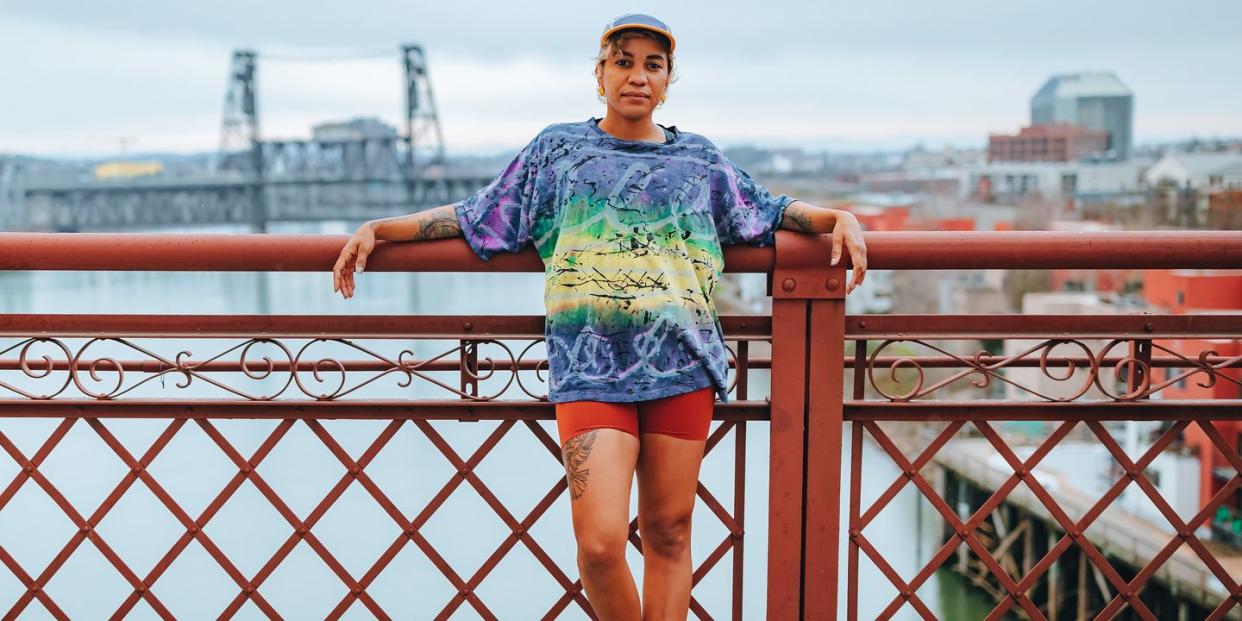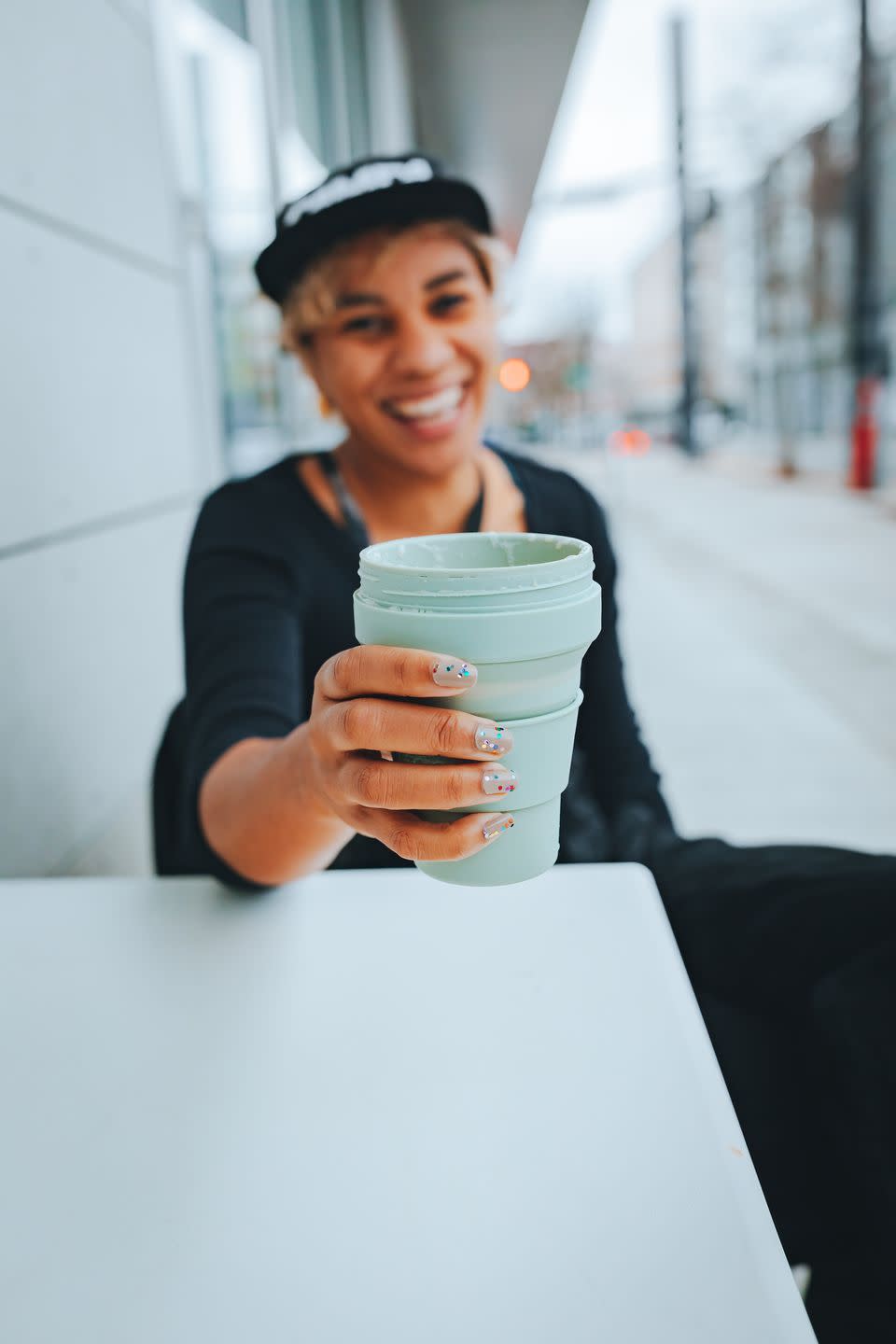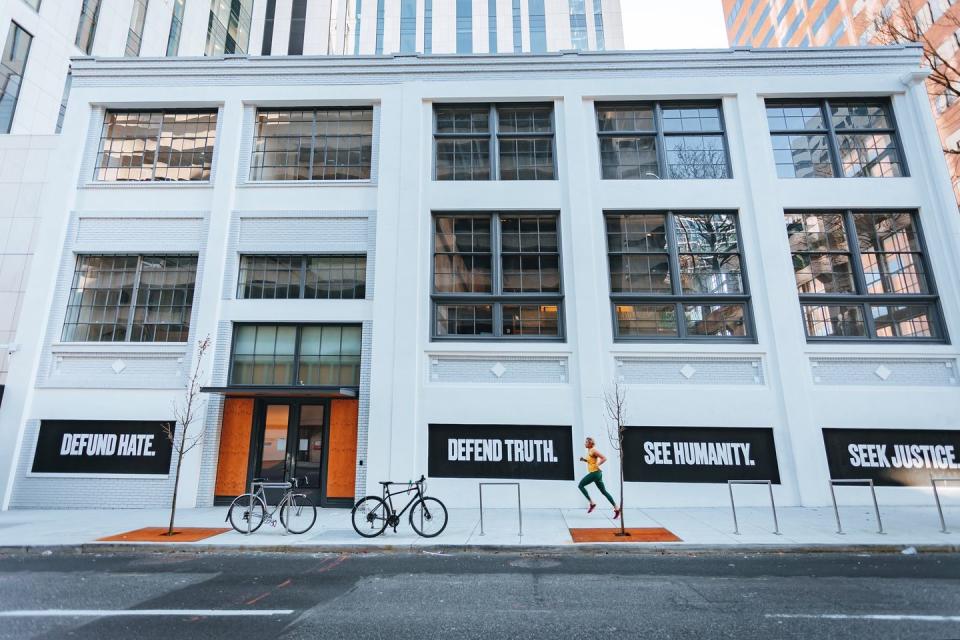This Portland Resident Uses Running and Filmmaking to Explore the City

Faith Briggs is a filmmaker, creative producer, and runner residing in Portland. She produced and is featured in the documentary This Land, which explores the impact of shrinking public land through the lens of running and inclusion. She launched a podcast about the project in March. Here, she writes about her experience as a transplant discovering a new city, and witnessing the region's complicated yet continuous fight for equity and inclusion.
I think the best way to fall in love with a city is through running—connecting with the world as you move from gravel to pavement, metal to cobblestone. There’s commitment in that connection. Each run feels like a new dedication and affirmation to your body and to the ground beneath you. On foot, in any city, whether born and bred or just arriving, my relationship with the streets becomes different.
Portland is a little city with a big heart, a troubled history and a deep desire to get it right. It’s full of transplants, like me, with hopes attached to the projection of the city they theoretically fell in love with before arriving. I moved here four years ago, with no familiarity or expectations. A friend sent some Portlandia episodes and a long list of restaurants where I could get vegan donuts, ramen, and brunch. Slowly, I began to learn the city.
There’s a lot of optimism here and sometimes that optimism clouds the acknowledgement and work needed for solidarity. In Portland, hard conversations around gentrification and houselessness are as much a part of this city as the parks, bike lanes, and quirky restaurants filled with amazing food and incredible people. That dissonance, and the desire to find common ground, is a huge part of this city.
I fell in love first because this place is so damn green. A lot of people move here, stay here, or come back home because of the “access.” By that, I mean we’re 45 minutes from the trails and rivers of the Columbia Gorge, an hour from the chairlifts at Mount Hood, and two hours from the iconic haystack rocks of the Oregon Coast. Dotted everywhere are breweries and vineyards, cheese factories, and boutique everything. We use online resources to book campgrounds and yurts. We sleep in our cars at trailheads and use words like Alpenglow. On the weekdays, we ride bikes and eat tacos, and on the weekends, we go to a mountain trail with amazing waterfalls or take a trip to the coast. The percentage of people who own tents and hydration packs has to be abnormally high compared to other cities. I had a second date camping in a National Park. When I moved, my parents described my life as watching a weird movie.

During the first month I lived here, I experienced more days of rain than I’d had in years living in New York. And the rain was different; it came at you left and right. Sometimes it rained all day, sustained and grey. Sometimes it came down in bursts, with rainbows peeking out as little apologies for the inconvenience of having to dress like you might get drenched at any moment.
I thought after nine months, I’d be back in Brooklyn dodging taxis, but Portland has become my new home. Running is different here; it’s much more individual for me. It’s a mix of roads and trails, and my training ebbs and flows with the seasons. I get into a groove better in summer. It’s easier to find friends to connect with for running adventures. People run here, they really run. This city, and region, is home to the biggest athletic brands in the world and some of the best running institutions. People eat marathons for breakfast.
Then there’s the trails. Forest Park is one of the biggest metropolitan parks in the country, with over 83 miles of trail within the city limits. We live in a temperate rainforest; I brag about that obscure fact now. I never knew I could care this much about moss. It coats the trees branch by branch—soft, dreamy, magical, so damn green. I’m kind of obsessed.
I also love the Willamette river, which cuts through the center of town. Bridges cross back and forth from East to West, each with its unique personality, giving us the nickname Bridge City. Some runs I criss-cross them, soaking up the river underneath. Water is calming for me. In mornings the fog rises from the water, and at night the lights dance in the reflection. I love how quickly you can run to the river from most parts of the city. My phone is full of videos that will never be shared on social media taken from midway across bridges.
My very first run here was fittingly to a donut shop. Portlanders love food carts and coffee, farmers markets, and justice—even if they haven’t always known exactly how to advocate for it. When I first moved here I noticed an abundance of Black Lives Matter signs and a lack of Black and Brown people. Now I understand better. As of 2020, so many more people here do.
The graffiti, murals, and public art downtown show the racial reckoning this city is still going through. The history of the state necessitates that we have to dig deep, unearth the subsurface truth, and lay it all on the table. We’ve had to get into the mess before we can get to any healing.
All eyes were on Portland this summer. On the news it seemed like the uprisings that challenged the nation, unmatched in their saturation and longevity, came from nowhere. I believe it was a boiling over across the country and specifically necessary here based on the widely unknown history.
What many Americans learned about Oregon in school begins and ends with the Oregon Trail. The reality is that race, exclusion, and discrimination is as much the culture of Oregon as it was in any Southern slave state before the Emancipation Proclamation. The residue of that culture does not concede easily.
There were exclusion laws in the 1840s and 1850s which meant Blacks and Chinese people couldn’t reside in the state. If you had slaves you had to free them—not out of benevolence, but because minorities couldn’t stay. White residents thought without unwanted Blacks, they’d be free of problems. Those laws were adopted into state constitution. Despite those odds, there was a small, vibrant Black community in the early 1900s, but it was plagued by waves of hate, violence, and tension.
The labor needs of World War II increased Portland’s Black population from barely 2,000 to 20,000. The backlash was predictable—more segregation, unions barring Black workers, “Whites Only” signs at restaurants. It’s all routine racism if you’re familiar with other instances of redlining, such as highways that cut through Black neighborhoods and the building of hospitals and coliseums that uprooted poor Black residents. The creation of federal housing projects, other housing off limits to Blacks. A flood there, in Vanport, where the dikes broke on the same day poor working residents were told not to evacuate.

And then fast forward to Portlandia. A show that broadcast a hilarious, quirky version of the city to the world, with no recognition of the ongoing gentrification that makes living here hard for Black folks, for Asians who were subject to the same laws, for Indigenous folks fighting for recognition and land rights.
The movement here is young and powerful, fighting for that recognition and change. It’s unapologetic, led by those most affected. It’s unrelenting. White Portlanders are learning to move from being allies to being co-conspirators. The signs are turning into actions. The city is abound with free fridges and mutual aid efforts, grandmothers are still out protesting weekly on corners, neighbors are learning how to stand up for neighbors. We’re still wrestling with who we are and who we want to be.
I believe in this city. In its desire to be as progressive as the rest of the nation thinks we are. I think we’ll get there and that the process of really getting to know a place, all of its beauty and soil, its hope and struggle, is done firstly in its streets.
You Might Also Like

